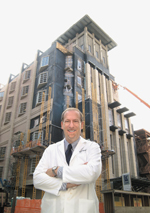HCC director aims for center status
Andrew Kraft, M.D., wants to bring the benefits of National Cancer Institute (NCI) designation to South Carolina as he assumes the directorship of the MUSC Hollings Cancer Center. Dr.
Andrew Kraft
Dr.
Andrew Kraft
He saw firsthand the benefits of a designated center at the University of Colorado Cancer Center where he headed the Experimental Therapeutics Program. In addition, he served as chief of the Medical Oncology Division and was the Stapp/Harlow Professor of Cancer Research at the University of Colorado Health Sciences Center.
For the citizens of South Carolina, NCI designation means the assurance of receiving cancer care from an established leader in the field of cancer treatment and education, and the opportunity to participate in clinical trials on a wide range of promising new cancer therapies.
Kraft said he recognizes that South Carolina faces great challenges, having both high incidences of a number of cancers and a large underserved population. He already sees great progress at Hollings and will build on advances made in the last several years.
“I was pleased to see the trend in growth of clinical trials in the past several years,” said Kraft. In 2001 Hollings enrolled 55 individuals in clinical trials. This jumped to 375 in 2003 and if the beginning of this year's trend continues, the number should exceed 500 for 2004. This clinical research is supported by $l.3 million from the federal government and private industry.
Kraft was also pleased with the increases in funding of other cancer-related research projects during the period from 2001 to the present, an increase from $16.5 million to $22.2 million.
Expected to be completed the summer of ’05, Kraft sees the seven-story addition to the Hollings Cancer Center as a major strength. The building will add 116,378 square feet of space to the existing structure, making a total of 202,139 square feet.
“Most importantly,” said Kraft, “it will pull our cancer programs together under one roof.”
J.G. Reves, M.D., dean of the MUSC College of Medicine and vice president for medical affairs, said that Kraft came to MUSC from a leadership position at an NCI-designated comprehensive cancer center. And he thoroughly understands the NCI philosophy on the creation of centers, particularly comprehensive cancer centers. “This will take the Hollings Cancer Center to NCI designation, first as a center and ultimately a comprehensive center,” he said.
Kraft said the Hollings Cancer Center is a resource for the entire state and that he looks forward to working with others in the state, including Columbia, Greenville and Spartanberg. “I feel that South Carolina’s disproportionately large cancer burden can best be approached by working together to maximize the state resources. In doing so we will benefit virtually every cancer patient in the state through education, research and clinical programs.”
His sentiments were echoed by Harris Pastides, Ph.D., vice president for research and health sciences at the University of South Carolina. “South Carolina is a small state, but one with excellent resources in cancer research and cancer patient care,” he said. “Dr. Kraft’s appointment heralds a renewed commitment for a statewide effort to make the Hollings Cancer Center a national leader in cancer research. The state’s other cancer programs stand ready to collaborate with Dr. Kraft to produce breakthroughs in basic scientific discoveries, as well as develop new approaches to effectively manage the care of patients and families who suffer from cancer. We firmly expect South Carolina to achieve increased recognition under his guidance and that tangible benefits will be apparent to the citizens of our state and region.”
William M. Butler, M.D., director of the Palmetto Health Cancer Center in Columbia, said he is excited by Kraft’s assumption of leadership of the Hollings Cancer Center. “I look forward to working with him as he leads the statewide effort towards building an NCI-designated cancer center,” he said.
Kraft’s specific interests are cancer of the prostate, sarcomas and novel cancer drug development.
A native of New York, Kraft received his B.S. degree summa cum laude
from Bucknell University and his M.D. degree from the University of Pennsylvania.
His advanced training includes a fellowship at the National Cancer Institute.
He held academic and clinical appointments at the University of Alabama
and its Comprehensive Cancer Center from 1983 to 1996, serving as associate
director of its Division of Hematology prior to accepting an appointment
at the University of Colorado.
Friday, Aug. 27, 2004
Catalyst Online is published weekly, updated
as needed and improved from time to time by the MUSC Office of Public Relations
for the faculty, employees and students of the Medical University of South
Carolina. Catalyst Online editor, Kim Draughn, can be reached at 792-4107
or by email, catalyst@musc.edu. Editorial copy can be submitted to Catalyst
Online and to The Catalyst in print by fax, 792-6723, or by email to petersnd@musc.edu
or catalyst@musc.edu. To place an ad in The Catalyst hardcopy, call Community
Press at 849-1778.